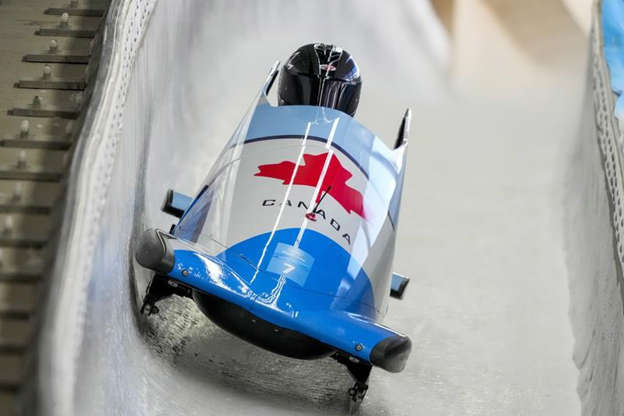International
De Bruin wins monobob bronze, Canada roars into women’s hockey final

BEIJING — Christine de Bruin wore an Olympic medal around her neck for the first time in her career, and the Canadian bobsledder liked the feeling.
“It feels awesome,” she said of the bronze medal she claimed in the Olympic debut of the monobob. “It feels heavy. It’s nice.”
No doubt, the feeling of two medals would be even nicer.
The native of Stony Plain, Alta., picked up Canada’s first sliding medal of the Beijing Olympics on Monday when she raced to third place in the monobob in a time of four minutes 21.03 seconds.
She will have a chance to add to Canada’s coffers in the two-woman event on Saturday. She said the knowledge of the track at Yanqing National Sliding Centre gained during her monobob runs should serve her well.
“It means that I have a really good understanding of the track and with Buj (Kristen Bujnowski), my brakewoman behind me, we have a very competitive push,” de Bruin said.
“Put the two together and we should have a great result.”
Kaillie Humphries, de Bruin’s former teammate, led a one-two punch atop the podium for the United States with a dominating time of 4:19.27. American veteran Elana Meyers Taylor took silver in 4:20.81.
Humphries picked up her fourth Olympic medal. She won two gold and a bronze in the two-woman event as a competitor for Canada before switching to represent the United States after the 2018 Pyeongchang Games.
Elsewhere on Monday, Canada assured itself of at least one more medal in Beijing with a 10-3 win over Switzerland in the women’s hockey semifinals. The Canadians will face the winner of a later semifinal between the United States and Finland for gold on Thursday.
Canada’s women’s curling team rebounded from a three-game losing streak with an 11-5 win over Russia, and looked to even its record with a win over Britain later Monday. The men’s curling squad improved to 4-2 with a comfortable 7-3 win over Italy. And the nation’s snowboarders look poised to add to their success after a total of five athletes qualified for the finals of the men’s and women’s big air events.
Max Parrot will be looking to follow up his gold-medal slopestyle performance from last week with a similar result in the big air, and appeared on form after topping the men’s qualifier.
Parrot said he was “stoked” by his performance, despite making a mistake on his third jump, but said his focus was firmly on the future.
“I’ve got my ticket for the final so really just focusing on that,” he said. “That’s what’s important. It’s not to finish first in (qualifiers) or second or third, it’s to make it to the final.”
Teammate Mark McMorris was eighth and Darcy Sharpe finished 12th to secure the last spot in the final. Sébastien Toutant, the event’s defending champion, fell twice and did not advance.
On the women’s side, Laurie Blouin qualified fourth for the big air final and Jasmine Baird was 10th.
Seventeen-year-old Olivia Asselin also qualified for the finals of the women’s freestyle skiing slopestyle. Asselin finished in 11th after scoring a 64.68 on her first run at the Genting Snow Park in Zhangjiakou. Megan Oldham, who finished fourth in the big air, did not advance to the final.
Humphries’ first gold medal sliding for the United States came after a trying four years that included an acrimonious split with Bobsleigh Canada Skeleton — the sport’s national governing body.
Humphries filed a harassment complaint with the organization in 2018, claiming she was “repeatedly and horribly verbally and mentally abused by the head coach.”
Todd Hays, who led the U.S. women’s team from 2011 to 2014, has been Canada’s head coach since 2017.
The allegations remain under investigation.
Asked if she had any words for Canada, Humphries started off by saying “not really” before continuing.
“I’m still Canadian,” said the dual citizen. “I will never forget my time as part of Canada, and I am so proud and honoured to still consider myself Canadian. I am also American. To me, it’s not a rivalry. I’m not picking and choosing one country over the other.
“Canada will always hold my past. Every single time I represented Team Canada, I did so with my heart and soul. The U.S.A. has my future.”
Toronto’s Cynthia Appiah was eighth on the 1,615-metre, 16-turn track located about 90 kilometres north of Beijing.
In women’s hockey, team captain Marie-Philip Poulin scored twice and Claire Thompson had a goal and two assists as the Canadians set a new Olympic tournament record with 54 goals.
“I know when you look at the Olympic scores, you kind of think it has been an easy road for us, but that could not have been any further from the truth,” forward Sarah Nurse said.
“We want to generate a ton of offence but we know we have to clean things up defensively. I know going into the championship (game) we will have to tighten some things up defensively.”
In figure skating, Toronto’s Piper Gilles and Paul Poirier of Unionville, Ont., finished a disappointing seventh in ice dance in what could be their last Olympics.
Gilles and Poirier botched a rotational lift, which was reflected in their score of 204.78.
Gilles fought back tears as she tried to explain what went wrong. Poirier said to her gently: “You were amazing.”
They could still capture a medal in the team event, pending the decision on the Russian team. Canada was fourth in the team event, but Russia, which was first, could be disqualified after it was revealed that 15-year-old superstar Kamila Valieva tested positive for a banned heart drug.
Valieva was cleared to continue competing by the Court of Arbitration for Sport on Monday, but any medal she wins could still be taken from her.
Those issues will be dealt with in a separate, longer-term investigation of the positive doping test that will be led by the Russian anti-doping agency.
The International Olympic Committee said Monday afternoon that if Valieva finishes in the top three, there will be no medal ceremony during the Games. There will also be no ceremony for the team event.
Canada’s Marion Thénault was seventh in women’s aerials. Thénault, from Sherbrooke, Que., just missed out on the superfinal with a 91.29 on her second run of the final. Thénault was part of the team that won the bronze medal in the mixed team aerials event.
China’s Xu Mengtao won gold with 108.61 points in the superfinal.
This report by The Canadian Press was first published Feb. 14, 2022.
The Canadian Press
International
Germany launches first permanent foreign troop deployment since WW2

 MxM News
MxM News
Quick Hit:
Germany activated a 5,000-strong armored brigade in Lithuania — marking its first permanent foreign military deployment since World War II. The move strengthens NATO’s eastern flank amid Ukraine’s ongoing conflict with Russia.
Key Details:
- The 45th Armored Brigade was formally launched outside Vilnius on Tuesday.
- Germany plans for the brigade to be fully operational by 2027 in Rūdninkai, near the Belarus border.
- The deployment marks a major policy shift for Berlin and a boost for NATO’s deterrence posture.
Diving Deeper:
Germany has officially entered a new era of military engagement, launching its first permanent foreign troop deployment since the end of World War II. The move, announced Tuesday, sees the activation of a 5,000-strong armored brigade in Lithuania as part of a broader NATO strategy to counter the perceived threat from Russia.
The newly formed 45th Armored Brigade was ceremonially inaugurated outside the Lithuanian capital, Vilnius. German Brigadier General Christoph Huber assumed command, overseeing the establishment of a temporary headquarters and unveiling the unit’s crest. “We have a clear mission: to ensure the protection, freedom and security of our Lithuanian allies on NATO’s eastern flank,” Huber said, adding that the unit’s presence also directly contributes to the defense of Germany and NATO as a whole.
The deployment follows a pledge made by Berlin in 2023 — a decision that broke with decades of postwar defense policy rooted in military restraint. German officials had long avoided permanently stationing combat troops abroad. That posture has changed in response to Russia’s ongoing war in Ukraine, which has turned the Baltic region into one of NATO’s most vulnerable frontlines.
Germany’s commitment includes more than just fighting forces. The brigade will also feature key support elements, such as a medical center, communications specialists, and command support units dispersed across multiple Lithuanian locations. Troops will initially operate out of temporary facilities, with a permanent base under construction in Rūdninkai, located roughly 30 kilometers south of Vilnius.
Currently, 150 German soldiers are already on the ground in Lithuania. That figure is expected to rise to 500 by the end of the year as the new brigade scales up operations.
Censorship Industrial Complex
China announces “improvements” to social credit system

 MxM News
MxM News
Quick Hit:
Beijing released new guidelines Monday to revamp its social credit system, promising stronger information controls while deepening the system’s reach across China’s economy and society. Critics say the move reinforces the Communist Party’s grip under the banner of “market efficiency.”
Key Details:
- The guideline was issued by top Chinese government and Communist Party offices, listing 23 measures to expand and standardize the social credit system.
- It aims to integrate the credit system across all sectors of China’s economy to support what Beijing calls “high-quality development.”
- Officials claim the new framework will respect information security and individual rights—despite growing global concerns over surveillance and state overreach.
Diving Deeper:
China is doubling down on its social credit system with a newly issued guideline meant to “improve” and expand the controversial surveillance-driven program. Released by both the Communist Party’s Central Committee and the State Council, the document outlines 23 specific measures aimed at building a unified national credit system that will touch nearly every corner of Chinese society.
Framed as a tool for “high-quality development,” the guideline declares that credit assessments will increasingly shape the rules of engagement for businesses, government agencies, and individual citizens. The system, according to the National Development and Reform Commission (NDRC), has already played a role in shaping China’s financial services, government efficiency, and business environment.
Critics of the social credit system have long warned that it serves as an instrument of authoritarian control—monitoring citizens’ behavior, punishing dissent, and rewarding obedience to the Communist Party. By integrating credit data across all sectors and enforcing a “shared benefits” model, the new guideline appears to entrench, not ease, the Party’s involvement in everyday life.
Still, Beijing is attempting to temper foreign and domestic concerns over privacy. The NDRC emphasized that the system is being built on the “fundamental principle” of protecting personal data. Officials pledged to avoid excessive data collection and crack down on any unlawful use of information.
-

 2025 Federal Election12 hours ago
2025 Federal Election12 hours agoMark Carney refuses to clarify 2022 remarks accusing the Freedom Convoy of ‘sedition’
-

 2025 Federal Election16 hours ago
2025 Federal Election16 hours agoPoilievre To Create ‘Canada First’ National Energy Corridor
-

 Bruce Dowbiggin14 hours ago
Bruce Dowbiggin14 hours agoAre the Jays Signing Or Declining? Only Vladdy & Bo Know For Sure
-

 2025 Federal Election15 hours ago
2025 Federal Election15 hours agoFixing Canada’s immigration system should be next government’s top priority
-

 Daily Caller13 hours ago
Daily Caller13 hours agoBiden Administration Was Secretly More Involved In Ukraine Than It Let On, Investigation Reveals
-

 2025 Federal Election2 days ago
2025 Federal Election2 days agoPoilievre promises to drop ‘radical political ideologies’ in universities
-

 Business2 days ago
Business2 days ago‘Time To Make The Patient Better’: JD Vance Says ‘Big Transition’ Coming To American Economic Policy
-

 Automotive2 days ago
Automotive2 days agoAuto giant shuts down foreign plants as Trump moves to protect U.S. industry

